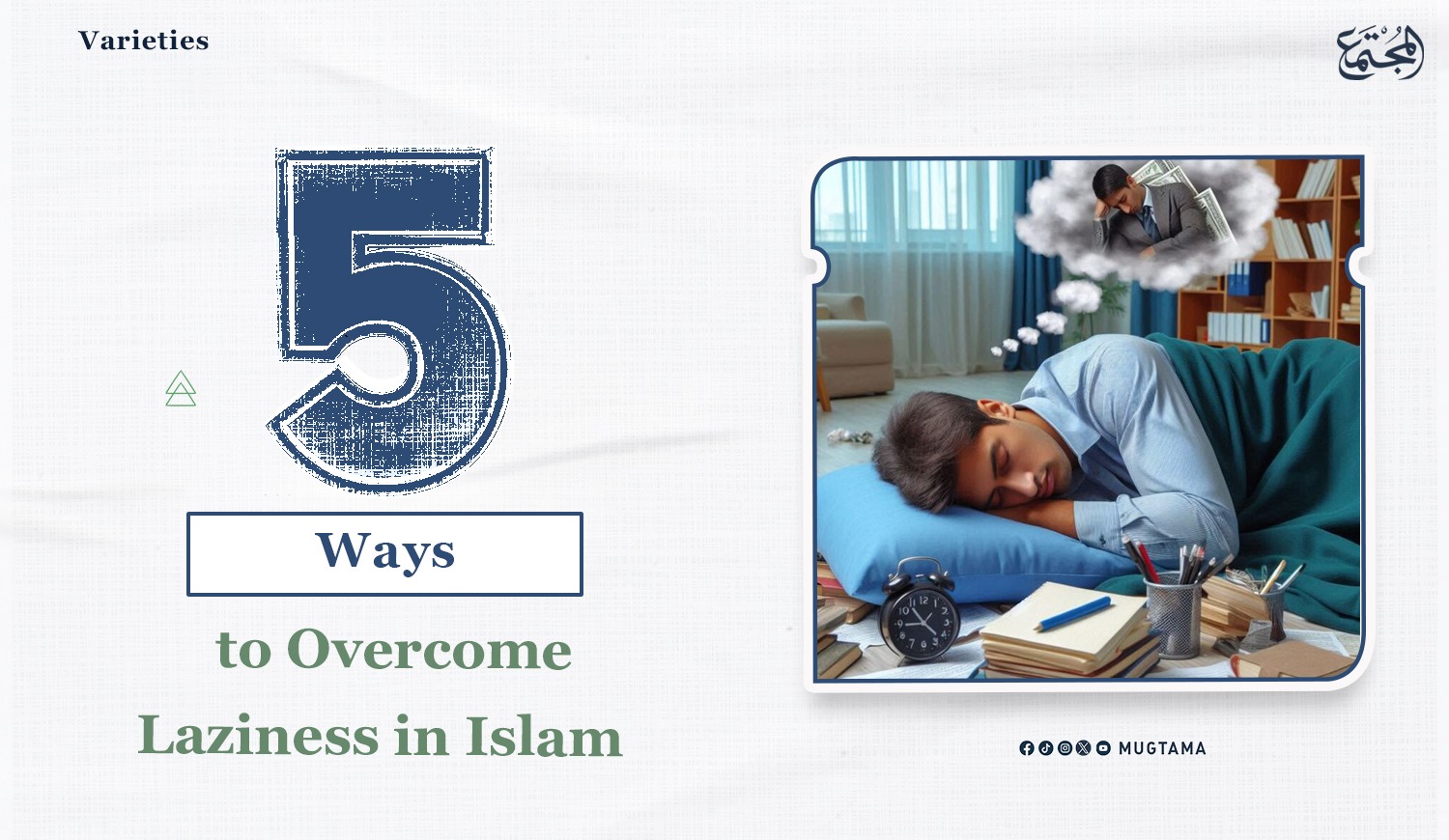5 Islamic Ways to Overcome Laziness in Islam

A person is born with countless wishes and
dreams; not a day passes without them gazing at these dreams with shining eyes,
hoping to make them come true. Although this longing is part of the innate
human nature Allah has created within us, there are many things that stand
between us and the realization of these dreams — the first of which is laziness
and inertia. For how can one who fails to climb the first step of the ladder
ever reach the peaks of his aspirations? Here are five ways to overcome laziness:
1. Strengthen your faith:
A Muslim cannot overcome laziness except with the help and guidance of Allah,
and with full conviction that work is an act of worship — that he is rewarded
for his effort and striving, even if he fails to reach his goal. Allah says: “And that each person will only have what they endeavored
towards” (An-Najm :39).
The Prophet (peace be upon him) also told us that deeds are judged by intentions, and
this in itself motivates a Muslim to strive and fight laziness, because time is
a trust Allah has placed in our hands, and we will be questioned about it on
the Day of Judgment. Whoever wastes it in the grip of idleness will be
punished, while whoever invests it in striving and hard work will receive the
best reward. The Prophet (peace be upon him) said: “Man's feet
will not move on the Day of Resurrection before he is asked about his life.”
2. Set clear and achievable goals:
Often, our many hopes collide and cancel each other out, leaving us lost and
confused, not knowing which path to take. This confusion pushes a person toward
laziness, suffocating him with apathy and loss of motivation. Therefore, it’s
crucial to set clear, measurable, and achievable goals that channel your energy
and reduce procrastination. Divide these goals into smaller daily tasks; before
starting each task, purify your intention for Allah and ask for His help. Every
time you complete a task, you climb one step closer to your goal — and
gradually, laziness will fade away.
3. Adopt a structured daily routine:
As Al-Busiri said:“The soul is like a child; if you neglect it, it will grow
fond of nursing, but if you wean it, it will be weaned.”
While many read this verse without
pondering its meaning, modern science has built an entire theory on this
concept: a consistent daily routine helps turn actions into habits. Thus, one
no longer faces internal resistance each time they need to work — because their
soul has become accustomed to diligence and effort, just as a child who was
weaned early adapts to it naturally.
Psychologists recommend setting fixed times
for sleeping, waking up, working, and exercising. With consistency and
repetition, the body and mind become used to these rhythms, making laziness
much less likely to appear.
4. Exercise regularly:
Laziness is often linked to a lack of physical activity. It’s rare — perhaps
impossible — to find a physically active person who struggles with chronic
laziness. Laziness and regular exercise simply cannot coexist in one body.
Studies show that exercise boosts the production of happiness hormones,
improves focus, and enhances energy and vitality — all of which leave no room
for idleness.
Therefore, Muslims are encouraged to
exercise regularly. Islam promotes physical strength, and the Prophet (peace
be upon him) said: “A believer who is strong (and
healthy) is better and dearer to Allah than the weak believer.” He also
instructed us to teach our children swimming, archery, and horseback riding.
5. Improve your work environment:
Enhancing your work environment is one of the most effective ways to eliminate
laziness and boost productivity. Organizing your space, reducing distractions,
and creating a calm, harmonious atmosphere directly improve your mental and
emotional state, increasing focus and readiness to work.
The mind strongly interacts with its
surroundings — when the environment is tidy and peaceful, starting work feels
easier and more natural, and productivity rises. Conversely, clutter and
distractions heighten resistance to starting tasks, feeding laziness and
procrastination. Hence, creating a motivating workspace is not a luxury; it is
an essential step for anyone seeking a more productive, active, and fulfilling
life.
-------------------------------------------------------------
1- Developing a practical and useful framework for goal-setting and
task motivation.
2- The brain under pressure: How does the social environment affect
the brain?
3- Explanation of the hadith on Dorar.net
Read Also:
-
10 Keysto a Healthy and Balanced Life










